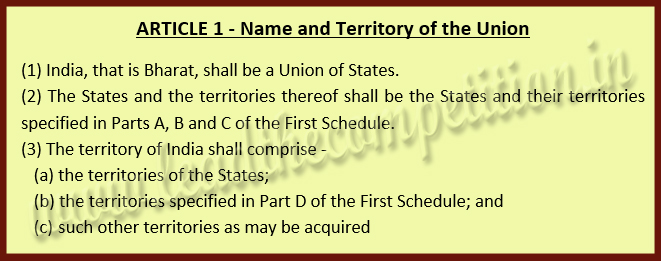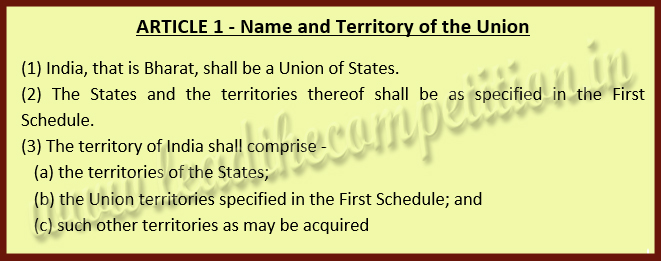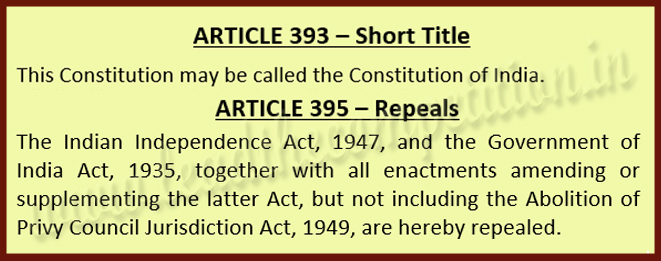Articles of Indian Constitution
*** इस पृष्ठ को हिंदी में पढ़े ***
Indian constitution contains 395 articles in Parts I to XXII and 12 schedules.
Important Articles of Indian Constitution
| Article | Importance |
|---|---|
| Article 12 –35 | Specify the Fundamental Rights available |
| Article 36-51 | Specify the Directive Principles of state policy |
| Article 51A | Specifies the Fundamental Duties of every citizen |
| Article 80 | Specifies the number of seats for the Rajya Sabha |
| Article 81 | Specifies the number of seats for the Lok Sabha |
| Article 343 | Hindi as official language |
| Article 352 | Proclamation of emergency by the President of India |
| Article 356 | Imposition of President’s Rule in states |
| Article 368 | Power of the Parliament to amend the Constitution and the procedure thereof. |
| Article 370 | Special status to Kashmir |
| Article 371 | Special provision with respect to the States of Maharashtra and Gujarat |
| Article 371A | Special provision with respect to the State of Nagaland |
| Article 371B | Special provision with respect to the State of Assam |
| Article 371C | Special provision with respect to the State of Manipur |
| Article 371D | Special provisions with respect to the State of Andhra Pradesh or the State of Telangana |
| Article 371F | Special provisions with respect to the State of Sikkim |
| Article 371G | Special provisions with respect to the State of Mizoram |
| Article 371H | Special provisions with respect to the State of Arunachal Pradesh |
| Article 371I | Special provisions with respect to the State of Goa |
| Article 371J | Special provisions with respect to the State of Karnataka |
| Article 395 | Repeals India Independence Act and Government of India Act, 1935 |
Original Article 1 of the Indian Constitution

Amended Article 1 of the Indian Constitution
Article 1 as amended by the Constitution (Seventh Amendment) Act, 1956

Article 393 and Article 395 of the Indian Constitution

Schedules to Indian Constitution
| Schedules 1 to 12 |
|---|
| First schedule contains the list of states and union territories and their territories |
| Second schedule contains provisions of salary and allowances to the President, Governors of States, Speaker and the Deputy Speaker of the House of the People and the Chairman and the Deputy Chairman of the Council of States and the Speaker and the Deputy Speaker of the Legislative Assembly and the Chairman and the Deputy Chairman of the Legislative Council of a State, the Judges of the Supreme Court and of the High Courts and the Comptroller and Auditor-General of India. |
| Third Schedule contains the Forms of Oaths or Affirmations. |
| Fourth Schedule contains provisions as to the allocation of seats in the Council of States. |
| Fifth Schedule contains provisions as to the Administration and Control of Scheduled Areas and Scheduled Tribes. |
| Sixth Schedule contains provisions as to the Administration of Tribal Areas in the States of Assam, Meghalaya, Tripura and Mizoram. |
| Seventh Schedule contains the Union list, State list and the concurrent list. |
| Eighth Schedule contains the list of recognised languages. |
| Ninth Schedule contains provisions as to validation of certain Acts and Regulations. |
| Tenth Schedule contains provisions as to disqualification on ground of defection. |
| Eleventh Schedule contains the powers, authority and responsibilities of Panchayats. |
| Twelfth Schedule contains the powers, authority and responsibilities of Municipalities. |
Slideshow on Fundamental Duties
www.leadthecompetition.in
Quiz on Articles of Indian Constitution
www.leadthecompetition.in
Select the Correct Answer
1. Which article specifies Hindi as the Official Language?
2. What is the total number of schedules to the Constitution of India?
3. Which articles specify the Fundamental Rights available to Indian citizens?
4. In which schedule are the recognised languages listed?
5. What is the total number of articles in the Constitution of India?
6. Which article specifies the Fundamental Duties for a citizen of India?
7. Which article deals with the imposition of President's Rule in a State?
8. Which schedule deals with the allocation of seats in Council of States to various states and UTs?
9. Which article deals with the power of the Parliament to amend the Constitution?
10. Which schedule contains the Union List, States List and the Concurrent List?
See also....
Questions on Constitution of IndiaWARNING
A lot of creative effort and time goes into development of pages on this site. Unscrupulous publishers copy and paste the content disregarding the protection offered by the Copyright Act, 1957. Such violaters are hereby warned of strict legal action if any of the content from this website is found to be copied and published elsewhere in any form, digital or otherwise.